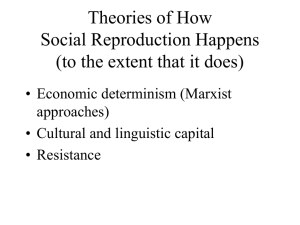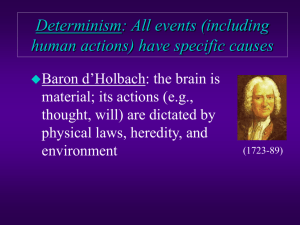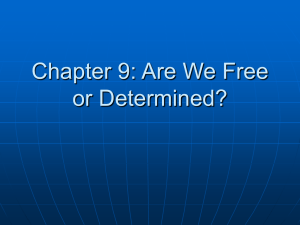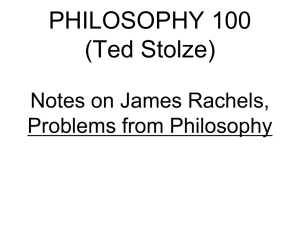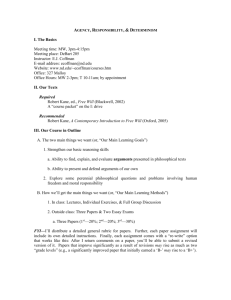9774 PHILOSOPHY AND THEOLOGY for the guidance of teachers
advertisement
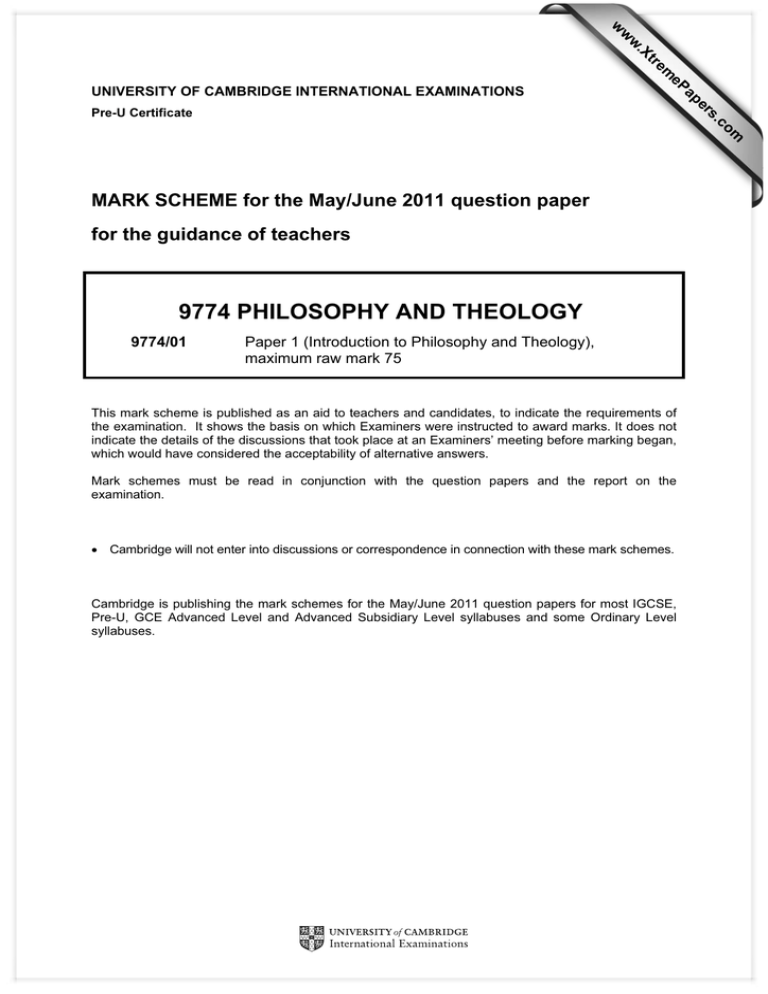
w w ap eP m e tr .X w UNIVERSITY OF CAMBRIDGE INTERNATIONAL EXAMINATIONS s er om .c Pre-U Certificate MARK SCHEME for the May/June 2011 question paper for the guidance of teachers 9774 PHILOSOPHY AND THEOLOGY 9774/01 Paper 1 (Introduction to Philosophy and Theology), maximum raw mark 75 This mark scheme is published as an aid to teachers and candidates, to indicate the requirements of the examination. It shows the basis on which Examiners were instructed to award marks. It does not indicate the details of the discussions that took place at an Examiners’ meeting before marking began, which would have considered the acceptability of alternative answers. Mark schemes must be read in conjunction with the question papers and the report on the examination. • Cambridge will not enter into discussions or correspondence in connection with these mark schemes. Cambridge is publishing the mark schemes for the May/June 2011 question papers for most IGCSE, Pre-U, GCE Advanced Level and Advanced Subsidiary Level syllabuses and some Ordinary Level syllabuses. Page 2 Mark Scheme: Teachers’ version Pre-U – May/June 2011 Syllabus 9774 Paper 01 AO1 Candidates will be required to demonstrate knowledge and understanding of the issues arising from the relevant religious and philosophical themes and texts; and the ability to identify, select and apply ideas and concepts, through the use of examples and evidence from recognised sources of authority. 40% AO2 Candidates will be required to provide a systematic critical analysis of the texts and theories they have studied, sustain a line of argument and justify a point of view. Different views, including those of different scholars and schools of thought, should be referred to and evaluated where appropriate. They should demonstrate a synoptic approach to the areas studied and make links between them and their responses where appropriate. 60% AO1 and AO2 are both to be considered in assessing each essay. The Generic Marking Scheme should be used to decide the mark. The essay should first be placed within a level which best describes its qualities, and then at a specific point within that level to determine a mark out of 25. The Question Specific Notes provide guidance for Examiners as to the area covered by the question. These question specific notes are not exhaustive. Candidates may answer the question from a variety of angles with different emphases and using different supporting evidence and knowledge for which they receive credit according to the Generic Marking Scheme levels. However, candidates must clearly answer the question as set and not their own question. Examiners are reminded that the insights of specific religious traditions are, of course, relevant, and it is likely that candidates will draw on the views of Jewish, Christian or Islamic theologians, as well as those of philosophers who have written about the concept of God from a purely philosophical standpoint. There is nothing to prevent candidates referring to other religious traditions and these must, of course, be credited appropriately in examination responses. © University of Cambridge International Examinations 2011 Page 3 Mark Scheme: Teachers’ version Pre-U – May/June 2011 Syllabus 9774 Paper 01 Generic Marking Scheme • • • Level 6 21–25 marks • • • • • • • Level 5 16–20 marks • • • • • • • • Level 4 12–15 marks Level 3 8–11 marks Level 2 1–7 marks Level 1 • • • • • Broad knowledge and understanding of a wide range of philosophical/religious issues Insightful selection and application of ideas and concepts Excellent critical engagement and detailed evaluation of the wider implications of the question Complete or near complete accuracy at this level Argument is coherent, structured, developed and convincingly sustained Employs a wide range of differing points of view and supporting evidence Good evidence of wide reading on the topic beyond the set texts Shows good understanding of the links between different areas of study where appropriate Confident and precise use of philosophical and theological vocabulary Knowledge is accurate and a good range of philosophical/religious issues are considered Systematic/good selection and application of ideas and concepts Good critical engagement and evaluation of the implications of the question Response is accurate: answers the question specifically Argument has structure and development and is sustained Good use of differing points of view and supporting evidence Some evidence of reading on the topic beyond the set texts Shows competent understanding of the links between different areas of study where appropriate Accurate use of philosophical and theological vocabulary • Knowledge is generally accurate and a fair range of issues are considered Reasonable selection and application of ideas and concepts Some critical engagement and evaluation of the question Response is largely relevant to the question asked Argument has some structure and shows some development, but may not be sustained Considers more than one point of view and uses evidence to support argument May show some understanding of the links between different areas of study where appropriate Reasonable attempt to use philosophical and theological vocabulary accurately • • • • • • • Some accuracy of knowledge. More than one issue is touched upon. Attempts to select and apply ideas with partial success Attempts to evaluate though with partial success Response is partially relevant to the question asked but may be one-sided Some attempt at argument but without development and coherence Some attempt to use supporting evidence Philosophical and theological vocabulary is occasionally used correctly • • • • • • Some key points made. Possibly repetitive or short Explores some isolated ideas related to the general topic Argument is limited or confused Response is limited or tenuously linked to the question Limited attempt to use evidence Philosophical and theological vocabulary is inaccurate or absent • No relevant material to credit • • 0 marks © University of Cambridge International Examinations 2011 Page 4 1 Mark Scheme: Teachers’ version Pre-U – May/June 2011 Syllabus 9774 Critically examine Plato’s theory of Forms. Paper 01 [25] Plato’s doctrine of metatheses theorised that since qualities have opposites, the physical nature of the universe must be balanced by the existence of a metaphysical realm. Whereas the physical universe is characterised by material objects that have extension in space and are subject to the processes of change and decay, the metaphysical realm is characterised by nonphysical Forms. Forms are the universals by virtue of which particulars in the physical world can be identified – for example, individual dogs are dogs by virtue of participating in the ideal/universal form of a dog. Metathesis applies both to physical and to abstract entities, so for example there are perfect forms of beauty, truth, justice and love. The over-arching Form is the Form of the Good, which qualifies all things. In the Simile of the Divided Line, Plato argues that empirical knowledge is characterised by belief, illusion and shadow, whereas true knowledge comes only through reason, and can be seen partly in the perfection of mathematics. Particular things change, decay, corrupt and die; but universals are immortal, changeless and incorruptible. Humans can have knowledge of the world of Forms through the agency of the immortal soul which, following the death of the body, ascends to contemplate the world of Forms. The soul reincarnates by virtue of its nature, and through anamnesis can remember something of the true knowledge of the Forms – demonstrable (according to Plato) by the mind’s ability to understand the a priori principles of logic, mathematics and geometry. Candidates might begin a critique of Plato’s ideas with Aristotle’s argument that form cannot be separated from matter, and that concepts such as beauty, truth and justice are not metaphysical at all, but apply to particular things; moreover there are no universals, only particular things sharing a common basic form. Some philosophers (Hume, Ayer et al.) reject all metaphysics, and hence reject Plato’s concepts out of hand. Plato claimed that only philosophers are capable of perceiving the Forms, whereas it could be argued that the Forms were a fiction devised by Plato to legitimise rule by philosophers. Others might defend Plato by defending metaphysics and rationalism, perhaps appealing to the fact that the mind can conceive of perfect mathematical shapes despite the fact that these exist only conceptually rather than physically. © University of Cambridge International Examinations 2011 Page 5 2 Mark Scheme: Teachers’ version Pre-U – May/June 2011 Syllabus 9774 Paper 01 ‘To have authority, belief must be backed up by strong rationalist arguments.’ Discuss. [25] Candidates are likely to approach this in relation to the language of the syllabus – i.e. the debate between rationalism and fideism. The issue with authority and belief hinges on the question of what, if anything, constitutes a ‘properly basic’ belief. The claim made in the question is that for a belief to be properly basic, it needs to be held in accordance with the dictates of reason, since a belief that is not based in reason can hardly be a source of credible authority. Thus evidentialists hold that beliefs are properly basic only where there is reasonable evidence for them, such as the theistic arguments for the existence of God. Strong foundationalists hold that beliefs are properly basic only if they are self-evident (like: ‘This is a hand’) or incorrigible (like: ‘I feel pain’). Those who maintain that their beliefs must have the authority of a strong foundation will therefore take a strong rationalist stance (e.g. Plato/Aquinas). Objections to foundationalist/rationalist approaches might come from a number of directions, such as the failure of the logical and inductive ‘proofs’ of God’s existence; conflicting beliefs in the world religions; verificationist and falsificationist challenges, and so on. Candidates are likely to contrast this approach with fideism, which holds that belief needs no rationalist verification or foundation, since belief by definition is self-authenticating, for example through the power of religious experience. Hence reformed epistemologists root authority in some form of primary experience. Candidates might refer, for example, to the work of James, Otto, Wittgenstein, Plantinga et al. A critique of fideism/reformed epistemology might centre on its inability to distinguish between rational and trivial beliefs, since any attempt to justify some beliefs as being inherently acceptable and to reject others as being trivial presupposes some form of rational judgement. Some might argue that Pascal’s ‘Wager’, as a voluntarist view of faith, bypasses rational arguments in favour of simple self-interest, although self-interest is arguably rational. Whatever arguments are offered need to take account of the wording of the question in relation to “authority”. Some might point out that it is possible to combine aspects of rationalism and fideism. © University of Cambridge International Examinations 2011 Page 6 3 Mark Scheme: Teachers’ version Pre-U – May/June 2011 Syllabus 9774 ‘Moral duty is defined solely by God’s commands.’ Critically assess this claim. Paper 01 [25] According to Divine Command Theory (DCT), God’s will is the sole ground of human moral values. The logic of this is usually grounded in the sum total of God’s attributes, including omnibenevolence, omniscience and omnipotence, where divine love, knowledge and power require an appropriate response from humans to God, however this is phrased. Aquinas’ Natural Law system was predicated upon the view that humans share a God-given common human nature, from which it follows that our understanding of moral good must include a telos, or goal of perfection, to aim at. It might be argued, however, that the relationship between the divine will and human morality is simply one of historical connection: for example in cultures influenced by Christianity, the Christian values of tolerance, equality and so on are built into those cultures. Anscombe argues that the concept of human moral obligation makes sense only in the context of a system that believes in God as the law-giver, which is why, in an era of declining belief in God the surviving form of morality makes no sense. Similarly, according to Alasdair Maclntyre, that sense of a perfected human nature has been lost. Whereas DCT showed the telos/goal as achieving heaven by morally good behaviour, ethics has lost this context, so there is no visible point to life. On this kind of view, then, God’s will/God’s commands can no longer be said to be the sole ground of moral duty, either logically or historically. Some might argue that God may not be needed to explain human morality at all, since the latter can with equal conviction be grounded in evolution, upbringing and psychology, emotion, invention, and so on. Moreover, quite apart from the possibility that God does not exist, and so cannot be the source of anything, many hold that DCT is based on the incoherent logic that tries to make sense of God’s alleged attributes. For example, it is held that omnibenevolence can hardly be a valid attribute of God: love can be expressed only within a community of moral equals, and by definition God is held not to exist in any such community. According to Bertrand Russell, Euthyphro’s Dilemma shows clearly that God’s relationship to the moral law cannot be defined coherently, since if God wills/commands the moral laws that we have arbitrarily, then God cannot be benevolent; and if God wills those laws because he acknowledges their force, then God is subject to them, and ceases to be omnipotent. Aquinas anticipated the first objection by claiming that God is not a moral agent – analogically, God’s goodness consists simply in being perfectly whatever it means for God to be good. For the second, candidates might claim that God commands the moral law simply because obedience to it is existentially important for humans. In that case, candidates might identify a number of factors that coincide with God’s commands, such as social harmony, shared telos and the like. © University of Cambridge International Examinations 2011 Page 7 4 Mark Scheme: Teachers’ version Pre-U – May/June 2011 Syllabus 9774 Paper 01 ‘Soft determinism is the only theory that offers humans the genuine possibility of free will.’ Discuss. [25] Candidates are likely to begin with an overview of the different viewpoints concerning the possibility of human free will. Freedom is defined, in this context, as the ability of rational agents to have control over the will. Determinism, conversely, argues that all human action is caused by preceding events, and not by the exercise of the will. Incompatibilist theories agree that determinism and free will are mutually incompatible, but differ as to the conclusion to be drawn from this. Incompatibilist determinists hold that there are no uncaused events, so determinism is true; incompatibilist libertarians hold that some human actions are free, so determinism is false. Soft determinism is a third approach which holds that there can be no freedom unless determinism is true: determinism is true, so agents are free to act within the constraints of their nature. Soft determinism therefore holds that freedom and determinism are compatible to this extent. Candidates might argue that determinism is true, for example in physics, genetics and psychology, and perhaps through God’s omniscience. The question then remains as to whether this allows compatibilism to be true also. Hume thought that it did (‘By liberty ... we can only mean a power of acting or not acting, according to the determinations of the will; that is, if we choose to remain at rest, we may; if we choose to move, we also may.’). Nevertheless many regard this as an unacceptable fudge, since if determinism is true, then the agent could not have chosen otherwise, since the agent’s will, like every other event, is completely determined. Libertarians generally hold that determinism is paradoxical, either in its incompatibilist or its compatibilist form: the determinist seeks to persuade the non-determinist that determinism is true, and thus ought to be believed; but on the basis of determinism itself, ‘ought’ has no meaning, because ‘ought’ means: ‘could and should have done otherwise’; but to do otherwise is impossible according to determinism. Moreover in order to determine whether or not determinism is true, there needs to be a rational basis for thought, otherwise no-one could know what is true or false. But determinism assumes that thought is the product of non-rational causes (such as the environment), so all thought is non-rational. On this basis, no-one could ever know whether determinism is true or not, so to argue that determinism is true is self-defeating. If this logic holds, then soft determinism offers no more convincing a path to free will than ‘hard’ determinism. © University of Cambridge International Examinations 2011
